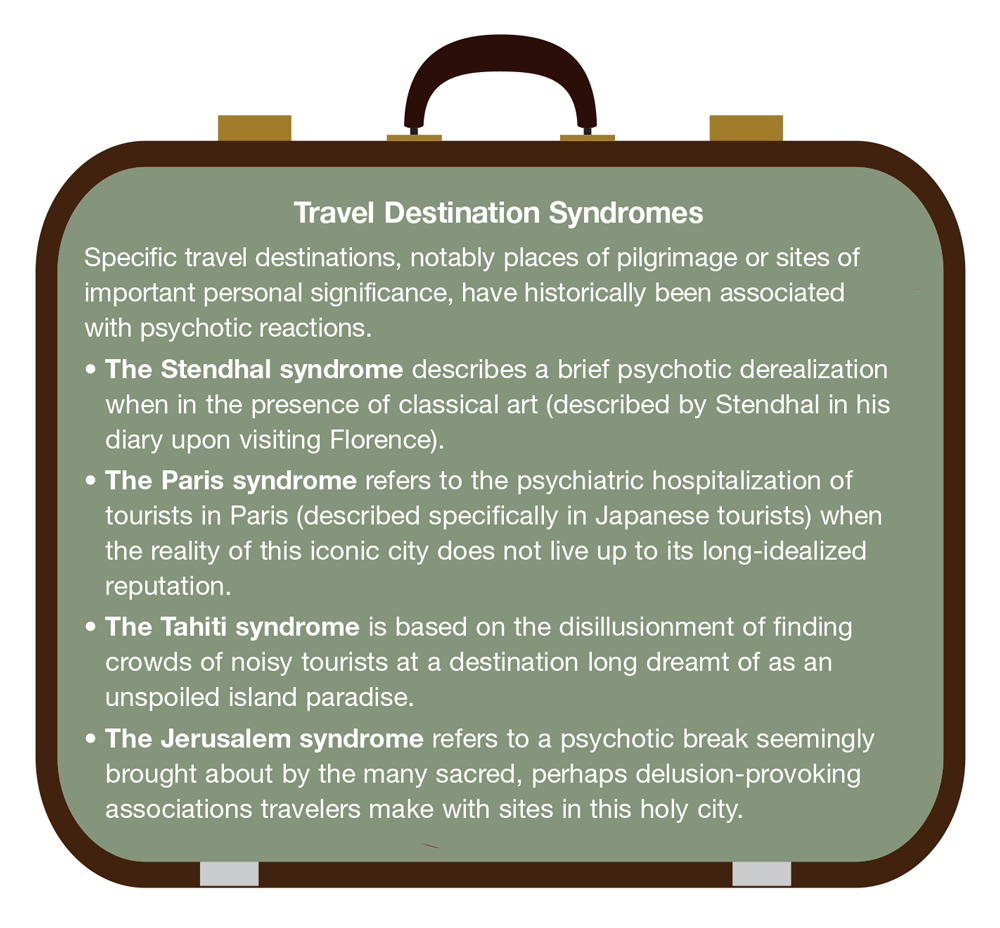
What should you do when patients with preexisting psychosis express an interest in lengthy travel?

Travel Destination Syndromes

Major life events, such as travel to unfamiliar places, can lead to an increase in general arousal and the exacerbation of psychotic symptoms in schizophrenia. Although most patients with schizophrenia cannot afford long-distance travel, some lead a quasi-permanent itinerant lifestyle, and many are able to take holiday trips with family.
Thanks to a generous donation a decade ago (called Cathy’s Fund after a former clinic member who had been a successful single parent despite serious long-standing psychotic illness), the Women’s Clinic for Psychosis in Toronto was able to sponsor travel abroad for some of its members.
The mission of the fund was to keep families together by helping women with schizophrenia reconnect with family members who lived far away, helping mothers reunite with estranged children, helping women visit and bond with distant friends and relatives, and allowing women to enjoy otherwise unaffordable holiday trips with relatives or close friends.
Mental health travel risks
Psychotic decompensation can occur during travel in persons with or without a psychiatric history. 1 Air travel, in particular, is implicated. According to the World Health Organization, mental illness constitutes 1 of the 3 main health crises encountered in air travel; the other 2 are physical injury and cardiac events. 2
Phobias such as fear of flying, enclosed spaces, crowds, or strangers can be triggered by travel. 3 About 20% of travel incidents are described as acute psychotic episodes-individuals with a history of a psychiatric disorder are the most susceptible. 4,5
For a patient with long-standing mental illness, travel may mean distance for the first time from trusted care providers and health resources.
The longer the travel, the higher the risk appears to be. Older age and cognitive compromise increase the risk. Use of alcohol and drugs constitutes a well-recognized risk factor for a psychotic reaction during travel. In addition, factors such as physical discomfort, forced immobility, motion sickness, and dehydration may all facilitate the emergence of psychiatric symptoms. Psychotic symptoms may also result from the adverse effects of drugs required for travel, such as mefloquine for malarial prophylaxis.
Special risks for patients with schizophrenia
Patients with preexisting schizophrenia face added risks, especially if their motive for travel is suspect (eg, a response to hallucinatory commands, a flight from supposed enemies). For a person with schizophrenia, even when the motive is realistic, uncertainty and bewilderment are easily induced by the unfamiliarity of an airport, a crowd, a foreign language, or the general excitement and arousal associated with travel. Arousal and fear can progress to full-blown delusion in predisposed persons.
Travel can also mean separation from a special person, from one’s home, country, and culture. For a patient with long-standing mental illness, travel may mean distance for the first time from trusted care providers and health resources. Separation from attachment figures is known to be intensely anxiety-provoking for patients with preexisting psychosis. 6
Even inanimate objects and familiar routines may be difficult to leave behind. The loss of a familiar environment can be as distressing as the loss of a person, leading to homesickness, nostalgia, and a profound sense of diminished belonging. The loss of one’s habitual social or occupational role during travel can also lead to a feeling of rootlessness and lost identity, even though the lost social role may be the stigmatized role of a psychiatric service user.
Alcohol and drugs, physical discomfort, motion sickness, sleep loss, dehydration, and prophylactic medications are all recognized for their ability to trigger psychosis even in individuals with no prior psychiatric history; their influence is that much more potent in people contending with psychotic illness. On arrival at one’s destination, jet lag and the demands of acculturation become the major stressors.
Trying to fit in to a new environment where norms, values, and social customs are unfamiliar can result in a form of acculturative stress that might heighten the risk for psychosis. Circadian rhythm disruption-such as changes in ambient light, desynchronization of mealtimes and medication routines, and especially sleep deprivation-can be destabilizing for anyone, but especially so for people with schizophrenia, who may be genetically vulnerable to disruptions of circadian rhythms. 7,8
Preventive preparations
The Women’s Clinic for Psychosis was able to prevent travel complications in clinic patients by careful pre-travel screening and coaching. 9,10 One clinic patient who was awarded a Cathy’s Fund scholarship had a police record because she had been brought to the hospital by police for psychiatric assessment at one point in the past. Staff needed to erase the police record or her access to the country of her destination would have been blocked.
Our patients were all advised to travel with prescriptions and doctors’ letters that explained their need for medications. We made sure they had medical insurance to cover the cost of hospital treatment in a foreign country, as well as potential emergency repatriation, should these prove necessary. We liaised with care providers at the destination site to facilitate easy access to psychiatric care.
For individuals who receive depot antipsychotic injections, we timed the injections to fit the patients’ travel plans and arranged for blood tests at the destination site to monitor patients on clozapine or lithium. We made sure to dispense sufficient medication to cover the time away. We suggested literature about the destination country and about the problems of and solutions to jet lag or seasickness. We rehearsed responses to potential travel stressors and practiced relaxation and breathing exercises with our patients before their trips. We cautioned against alcohol and caffeine overuse.
What should clinicians do when patients with preexisting psychosis express an interest in lengthy travel?Next page >>
Recommendations for clinicians
What should you do when patients with preexisting psychosis express an interest in lengthy travel? Unless patients are acutely psychotic and potentially dangerous to themselves or others and they have the funds to pay for at least a one-way ticket, they cannot be prevented from traveling-no matter how ill-advised you may think the trip is. Measures to prevent serious consequences, however, need to be put in place.
Checking into finances is a good starting point. It is vital that the patient have the funds to cover not only the roundtrip costs of travel but also the stay away from home plus unexpected expenses. Many patients with psychosis live on monthly disability payments that are sent to their home address. Before leaving on a lengthy trip, they must make arrangements for their check to be forwarded.
If the patient intends to travel with a family member or friend, it is useful that all meet together to discuss travel plans. Should the patient be traveling alone, extra safeguards are needed, especially if family members are not fully aware of the plans.
More logistics
The range of ways that travel can affect a person’s mental heath needs to be fully addressed by discussing its effects not only on finances but also on sleep, stress levels, personal and professional relationships, medication schedules, feelings of belonging, and identity. The patient needs to be helped to prepare a travel medical portfolio, which might include contact information for people who are to be notified in case of emergency; care providers at home; and physicians, hospitals, and pharmacies that can be accessed as needed. The address and telephone number of the home consulate are useful as well.
Physicians need to prepare patients for the possibility of loneliness, homesickness, and culture shock.
The patient’s physician should also prepare a letter to be included in the portfolio that specifies all pre-travel inoculations, a list of allergies, all current medications with their doses and schedules, and all required blood tests. The names of medications differ in different countries; the name used in the country of destination should be used. The portfolio also needs to contain medical insurance information, recent exposure to infection if applicable, and the possibility of pregnancy, should that be a concern. The physician may want to include a letter stating that the patient is fit to travel.
Depending on the situation, the patient may also be advised to carry a medical kit that contains a sufficient amount of daily medications in the original containers, a thermometer, sunscreen, insect repellent, antiseptic wipes, condoms, antacids, and laxatives. A medical bracelet may be useful.
The effects of time change on sleep, meal times, and medication schedules all need to be discussed with the patient. Temperature changes and dehydration need to be warned against as they may lead to drug toxicity. Because some persons with psychotic illness habitually use illicit substances, physicians need to warn them about the laws of the countries they are visiting, since some have very severe penalties for drug possession.
Physicians need to prepare patients for the possibility of loneliness, homesickness, and culture shock when traveling. Reading up on the new country’s language, traditions, laws, and ways of life helps. Preparation will not prevent the occurrence of these very natural reactions to travel, but patients will be able to recognize them for what they are and be better able to adapt.
Part of the preparation may be ensuring that the patient has the means and the know-how to phone home from wherever he or she is and stay in touch with attachment figures. Practical issues, such as making sure passports are valid and visas and vaccinations are obtained when necessary, advice on what to pack and on compatible electronic equipment, and information about the new country’s currency and accessible locations for money exchange, are also within the physician’s purview.
Because of terrorism alerts, it is important to advise patients on what to wear or not to wear, and what to refrain from saying at airports or on board airplanes. Patients who do not pay attention to hygiene or grooming may be singled out as potential security threats. The process of security checks on airplanes and long lines and delays at airports need to be carefully explained to patients who are not used to them because they invariably cause stress and can arouse paranoia.
Patients also need to be told what they cannot bring onto airplanes and advised on the process of boarding passes and check-ins. The more information they have on what they may encounter, the less strange and destabilizing travel will be.
Dr. Seeman is Professor Emerita, Department of Psychiatry, Institute of Medical Science, Toronto, Canada. She reports no conflicts of interest concerning the subject matter of this article.
1. Flinn DE. Transient psychotic reactions during travel. Am J Psychiatry. 1962;119:173-174.
2. World Health Organization (WHO) International Travel and Health. Psychological health. General considerations, 2014. http://www.who.int/ith/other_health_risks/psychological_health/en/. Accessed July 6, 2016.
3. McIntosh IB, Swanson V, Power KG, et al. Anxiety and health problems related to air travel. J Travel Med. 1998;5:198-204.
4. Felkai P, Kurimay T. The most vulnerable travelers: patients with mental disorders. World Psychiatry. 2011;10:237.
5. Vermersch C, Geoffroy PA, Fovet T, et al. Travel and psychotic disorders: clinical aspects and practical recommendations [in French]. Presse Med. 2014;43:1317-1324.
6. Burnham DL. Separation anxiety: a factor in the object relations of schizophrenic patients. Arch Gen Psychiatry. 1965;13:346-358.
7. Johansson AS, Owe-Larsson B, Hetta J, Lundkvist GB. Altered circadian clock gene expression in patients with schizophrenia. Schizophr Res. 2016;174:17-23.
8. Wulff K, Dijk DJ, Middleton B, et al. Sleep and circadian rhythm disruption in schizophrenia. Br J Psychiatry. 2012;200:308-316.
9. Roupa Z, Zikos D, Vasilopoulos A, Diomidous M. Common health risks, required precautions of travelers and their customs towards the use of travel medicine services. Mater Sociomed. 2012;24:131-134.
10. Tafuri S, Guerra R, Gallone MS, et al. Effectiveness of pre-travel consultation in the prevention of travel-related diseases: a retrospective cohort study. Travel Med Infect Dis. 2014;12:745-749.